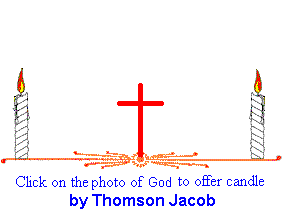

Pray for us
X Mas
Good Friday
Easter
In the winter of 5 or 4 B.C., God invaded history by taking on the form of a man. He was born in a small town just south of Jerusalem. Bethlehem, which means 'the house of bread,' indeed became worthy of its name one lonely winter night. For there, in that town, was born the Bread of Life. . .
His mother placed the infant king in a manger--or feeding trough--because the guest room where they were to stay was occupied. The birth of this king was celebrated that night only by his mother, her husband, and a handful of shepherds. The shepherds had been in the fields around Bethlehem, guarding the lambs which would die at the next Passover. An angel appeared to them and gave them the birth announcement: "today in the city of David there has been born for you a Savior, who is Christ the Lord" (Luke 2:11). In their simple faith, they rushed to see their newborn king.
Shortly after the birth of the Messiah, magi from the east arrived in Jerusalem and inquired of king Herod where the real king of the Jews was to be born. The theologians of Herod's court knew the Scriptures well--in 'Bethlehem' they recited. Ironically, though they knew the Scriptures, they did not believe them! They did not even bother to travel the five or six miles to Bethlehem to see their Messiah.
But Herod believed the Scriptures! That is why he sent a corps of butchers to Bethlehem to slaughter innocent children, in hopes of destroying this rival to his throne. But he was too late. The magi had come and gone and Jesus was by now safe in Egypt.
And the magi believed the Scriptures. They had traveled several hundred miles to worship this Babe. They were guided to Bethlehem by a supernatural celestial phenomenon--and by the Scriptures. Apparently, their ancestors had been instructed by Daniel the prophet about the coming Messiah. . . When they saw the child, they fell down and worshiped him. This was God in the flesh. They could do no other.
And they gave him gifts--gold, frankincense, and myrrh. This was an unusual present--by any standards. The gold, of course, we all can understand--but the frankincense and myrrh were odd. Perhaps they had read Isaiah's prophecy that "nations will come to your light, and kings to your rising . . . They will bring gold and frankincense, and will bear good news. . . " (Isa. 60:3, 6). This explains the frankincense, but not the myrrh.
Now myrrh, like frankincense, was a perfume. But unlike frankincense, myrrh smelled of death. In the ancient world, it was used to embalm a corpse. Jesus himself would be embalmed with this very perfume (cf. John 19:39).
If the magi were thinking of Jesus' death when they brought the myrrh, they no doubt knew of it from Daniel's prophecy (9:24-27). In the ninth chapter of Daniel we read that the 'Messiah will be cut off' and this 'will make atonement for iniquity' and ultimately 'bring in everlasting righteousness' (9:26, 24).
Even at the birth of our Savior, the shadow of the cross is already falling over his face. . .
The theologians of Herod's court did not believe the Scriptures. They were fools. Herod believed, but disobeyed. He was a madman. The simple shepherds and the majestic magi believed in this infant Savior--and it was reckoned to them as righteousness. May we follow in their train.